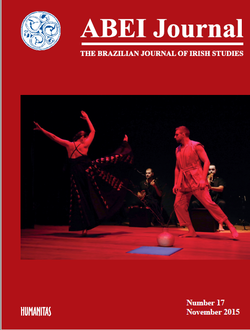“What remains of all that misery?” Time, habit and memory in Samuel Beckett’s Krapp’s Last Tape
DOI:
https://doi.org/10.37389/abei.v17i0.3541Аннотация
This article discusses how the flow of time in Krapp’s Last Tape constitutes an element of suspense to keep the audience’s attention and interest throughout. It also analyses the way Beckett’s play explores the paradoxical connection between time and meaning which, along with the corrosively comic potential it holds, offers the audience the opportunity to philosophize in concrete and existential terms.
Keywords: Samuel Beckett; Krapp’s Last Tape; existentialism.
Загрузки
Опубликован
2015-11-17
Выпуск
Раздел
Drama
Как цитировать
Poiana, F. A. (2015). “What remains of all that misery?” Time, habit and memory in Samuel Beckett’s Krapp’s Last Tape. ABEI Journal, 17, 77-87. https://doi.org/10.37389/abei.v17i0.3541


